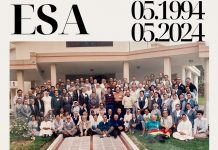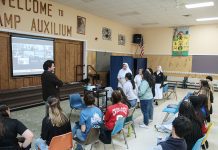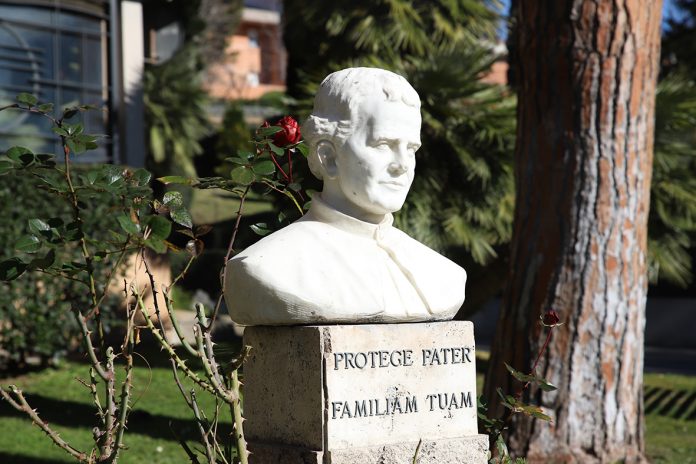Rome (Italy). On the occasion of 31 January 2024, Solemnity of Saint John Bosco, Founder with Saint Mary Mazzarello of the Institute of the Daughters of Mary Help of Christians, Sister Piera Cavaglià, former Secretary General of the Institute, presents the rapport that Mother Catherine Daghero had with the Founder, who this year marks the centenary of his birth into heaven:
We can say that Mother Caterina Daghero (1856-1924) was formed as an educator and as a woman of government by Mother Mazzarello and Don Bosco, because she is so imbued with the Salesian spirit!
From the time she entered the Institute in Mornese (1874) until the death of Don Bosco (1888), she not only met the Founder many times, but enjoyed a deep familiarity with him. She considers him a father, a guide, a counselor, an undisputed point of reference for any decision concerning the animation of the Institute. And Don Bosco also expresses a fatherly affection for his young ‘daughter’. This is attested by some brief writings addressed to her, also on the occasion of her name day.
Like Mother Mazzarello, Mother Catherine is only concerned to remain faithful to Don Bosco: he is the Founder, the Saint, the true interpreter of the Salesian charism. After his death, she ardently hoped to see him arrive at Beatification, and she says with conviction, “then I will desire nothing else!”
Catherine Daghero had the privilege of making religious vows in Mornese in the hands of Don Bosco on 28 August 1875.
She spent the first years of her religious life in Turin at the school of Don Bosco and therefore had the opportunity to confront herself continuously with him and with Fr. Michele Rua, director of the women’s oratory. In Valdocco she experienced the security of living in contact with the Founder and this enriched her both at an educational and institutional level when she had to lead the Institute. From him he learns the secret of attracting the girls to the oratory and draws heavily from the source of the da mihi animas cetera tolle.
When on 12 August 1881 in Nizza Monferrato, she was elected Superior General, Don Bosco was present presiding over the elective assembly. He gave her “the dispensation”, because to be Mother General one must be at least 35 years old and Sister Catherine was just 25!
On that occasion, Don Bosco said to the Sisters, “You had a holy Mother and already you have another who will not be less so….” And he gives the newly elected a box of macaroons and one of confetti with a handwritten letter in which he indicates the important criteria for government:
Rev. Mother Superior Gen.,
Here are some sugared almonds to distribute to your daughters.
Keep for yourself the sweetness to be practiced always and with all; but be always ready to receive the macaroons, or rather the bitter morsels when God pleases to send them to you.
May God bless you and give you virtue and courage to sanctify yourself and the whole community entrusted to you.
Pray for me who am in J.C. Humble servant Sac. Gio. Bosco.
Nizza Monf. 12 ag. 1881.
Mother Catherine remained faithful to this mandate and throughout her life she walked on the paths of maternal sweetness and resilience in facing the labors and challenges of governing an Institute that extended itself at a fast pace in space and time. For good animation she lets herself be inspired by the principle: We must see with our eyes, touch us with our hands… and therefore she set out on a journey to visit the houses and educational works and remained two uninterrupted years in Latin America (1895-’97).
She guides the sisters and communities with the authenticity of her being a woman consecrated to Jesus and a Salesian educator, at the service of a mission that surpasses her. With simplicity, she made available her gifts of intuition, intelligence, practical wisdom, faith, and motherhood.
She has to live in a difficult time full of challenges marked by processes of transformation and renewal at the social, political, cultural levels and, at the same time, by the strong pressures of liberalism, socialism, and anti-clericalism. The most dramatic event was the outbreak of the First World War (1914-1918). The Institute is therefore asked to modify the works in order to make an effective contribution to the dramatic situation. Moreover, she lived at a time marked by strong internal changes also at the institutional level. The most painful is the juridical autonomy of the FMA Institute with the consequent separation from the Salesian Congregation (1906-1907), to adapt to the Normae secundum quas issued by the Church in 1901.
Mother Daghero feared that the nature of the Institute would be distorted if it did not remain faithful to what Don Bosco prescribed in the first Rules, explaining total dependence on him. She considers separation “the maximum of misfortunes” and does everything so that it would not come true. Then, when she holds in her hands the new Constitutions corrected by the Congregation of Bishops and Regulars, where it does not even mention that the Institute was founded by Don Bosco, even in suffering, she bows her head in obedience to faith. She also helped the Sisters to live this new turning point of daughters of Don Bosco, who considered as a command even only a desire of the Pope.
She lived the new situation wisely and boldly, giving the Institute a new impulse in the line of responsibility, consolidation, formation, and apostolic creativity. She is convinced that she has received a precious legacy to cherish and strengthen. The fundamental criterion for every choice is always that of fidelity to Don Bosco, “We belong to Don Bosco. We must think, do, pray, live as he taught us.” However, she is aware that she is living through unexpected challenges and is not afraid of new things and of changes.
Scholars note that the disciples of a Founder tend by instinct to consider the rule, tradition, lifestyle, everything untouchable and sacred! Mother Catherine, as faithful to Don Bosco as Mother Mazzarello was, intuited unprecedented dimensions of the Charism and allowed herself to be continually questioned by new situations. She considers them “calls of God” to intervene with courage, without the fear of betraying the mandates.
Michelle Perrot will say in her contribution on the history of women in the nineteenth century that she is a woman who has “the omen of new times,” so she never tires of teaching, “We must always be at the forefront of charity!”
She thus allows the Institute to continue to flourish in time and space, extending to four continents. In times of serious social and educational emergencies, she leads the Institute along the safe guidelines of preventive education, of taking care of those who are most disadvantaged, even along uncomfortable and unpopular paths. She opens houses to accommodate as many orphans as possible. She started the Workers’ Hostels, established Schools for the professional preparation of teachers, and better systematic formation centers for the missionaries. She knows that the Salesian preventive method must be rethought and retranslated in new areas of education and this is the challenge; to be with Don Bosco, but at the same time with the times.
The spirit of the Founders is not a relic to be kept with jealous care, but is a source of inspiration, a seed of the future and therefore opens new horizons unknown to the Founder himself.





















Grazie, Sr Piera, apri sempre orizzonti nuovi!
Grazie suor Piera per tenerci informate di questi bei ricordi
Grazie Sr Piera, per ricordarci delle nostre sorelle pionere, sorelle che ci hanno transmission il carisma in fedeltà a Don Bosco e a Madre Mazzarello.
Jacinta Gusmão.
Grazie Sr Piera. Ti leggo sempre volentieri eri ricordo con tanto affetto
Carissima sr Piera, grazie per questa bellissima presentazione di M.Caterina Daghero.
Sarà una motivazione di amare di più l’Istituto e il carisma.
Sr Teresa Szewc
Grazie Sr Piera di questa tua bellissima comunicazione di testimonianza salesiana.
Me ne serviro per una B.notte in questi giorni in preparazione alla festa di Don Bosco.
È una sfumatura di Madre Daghero che non conoscevo.
Essere fedeli a D.B. e M.M. con lo sguardo sempre rivolto alle novità e alle sfide che i giovani ci presentano oggi.
Grazie! Attendiamo da te sempre questi doni.
Sr Ausilia P
Grazie sr. Piera per questo articolo. E’ sempre bello ed arricchente leggerti! Grazie per la profondità dei tuoi scritti e per le nuove vie che sai indicare.
sr. Luigina Ariu